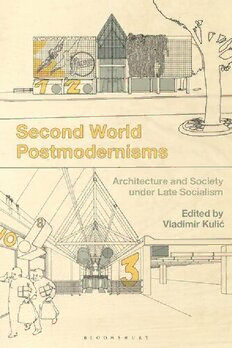Download Second World Postmodernisms: Architecture and Society under Late Socialism PDF Free - Full Version
Download Second World Postmodernisms: Architecture and Society under Late Socialism by Vladimir Kulić in PDF format completely FREE. No registration required, no payment needed. Get instant access to this valuable resource on PDFdrive.to!
About Second World Postmodernisms: Architecture and Society under Late Socialism
If postmodernism is indeed ‘the cultural logic of late capitalism,’ why did typical postmodernist themes like ornament, colour, history and identity find their application in the architecture of the communist-socialist Second World? How do we explain the retreat into paper architecture and theoretical discussion in societies still nominally devoted to socialist modernization?Exploring the intersection of two areas of growing scholarly interest—postmodernism and the architecture of the socialist and former-communist world—this edited collection stakes out new ground as the first work to chart the various transformations of second world architecture in the 1970s and 80s. Sixteen essays together explore the question of whether or not architectural postmodernism had a specific second world variant.The collection ultimately aims to demonstrate both the unique nature of second world architectural phenomena, and also to assess connections with western postmodernism. The work comprises sixteen truly diverse case studies, covering not only the vast geographical scope of the former socialist world, but also a wealth of aesthetic, discursive and practical phenomena, interpreting architecture in the broader socio-political context of the last decades of the Cold War. The result should provide a greatly expanded map of recent architectural history, which redefines postmodernist architecture in a more theoretically comprehensive and global way
Detailed Information
| Author: | Vladimir Kulić |
|---|---|
| Publication Year: | 2019 |
| ISBN: | 9781350014428 |
| Pages: | 269 |
| Language: | English |
| File Size: | 27.828 |
| Format: | |
| Price: | FREE |
Safe & Secure Download - No registration required
Why Choose PDFdrive for Your Free Second World Postmodernisms: Architecture and Society under Late Socialism Download?
- 100% Free: No hidden fees or subscriptions required for one book every day.
- No Registration: Immediate access is available without creating accounts for one book every day.
- Safe and Secure: Clean downloads without malware or viruses
- Multiple Formats: PDF, MOBI, Mpub,... optimized for all devices
- Educational Resource: Supporting knowledge sharing and learning
Frequently Asked Questions
Is it really free to download Second World Postmodernisms: Architecture and Society under Late Socialism PDF?
Yes, on https://PDFdrive.to you can download Second World Postmodernisms: Architecture and Society under Late Socialism by Vladimir Kulić completely free. We don't require any payment, subscription, or registration to access this PDF file. For 3 books every day.
How can I read Second World Postmodernisms: Architecture and Society under Late Socialism on my mobile device?
After downloading Second World Postmodernisms: Architecture and Society under Late Socialism PDF, you can open it with any PDF reader app on your phone or tablet. We recommend using Adobe Acrobat Reader, Apple Books, or Google Play Books for the best reading experience.
Is this the full version of Second World Postmodernisms: Architecture and Society under Late Socialism?
Yes, this is the complete PDF version of Second World Postmodernisms: Architecture and Society under Late Socialism by Vladimir Kulić. You will be able to read the entire content as in the printed version without missing any pages.
Is it legal to download Second World Postmodernisms: Architecture and Society under Late Socialism PDF for free?
https://PDFdrive.to provides links to free educational resources available online. We do not store any files on our servers. Please be aware of copyright laws in your country before downloading.
The materials shared are intended for research, educational, and personal use in accordance with fair use principles.

